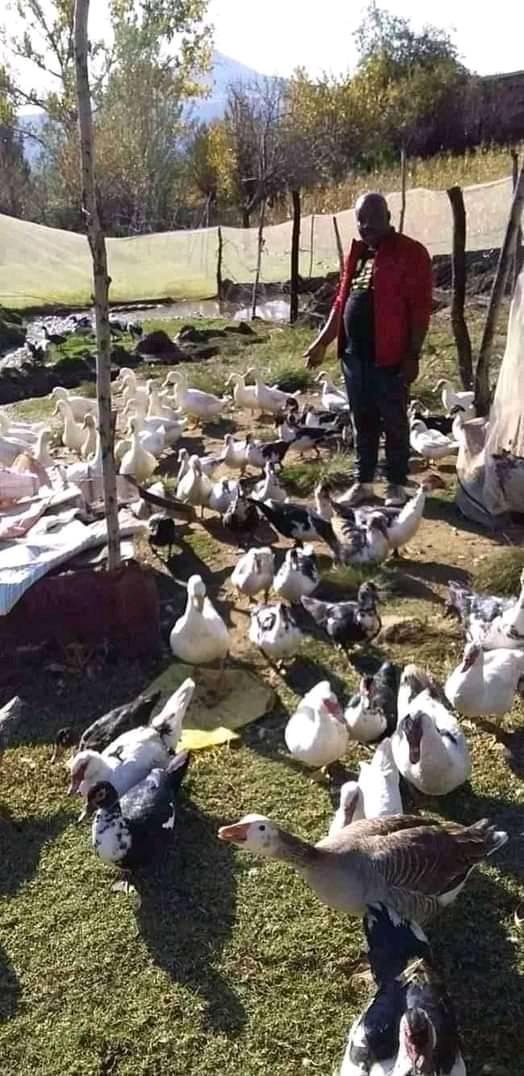Africa-Press – Lesotho. WHEN Thabiso Matšoele, a teacher at Mahobong High School, quit alcohol six years ago, farming became his new hobby. Born and raised in Mohope, Mahobong, the 42-year-old has become an inspiration to many.
When he adopted farming as a new hobby, Matšoele planned agri-tours visiting farms in South Africa, Botswana and Eswatini. He also started a Facebook page called Young Lesotho Farmers sharing farming information, which later turned into an association.
Eventually he started Monakeli Farm. “It was at this point that I realised that I also had to partake in farming beyond these tours. I had to live it,” Matšoele said.
“I started rearing free range poultry. I bought land, incubators and had 700 chickens. ” This project opened his eyes to a variety of possibilities in the farming sector.
“I realised that there is money in the sector,” said Matšoele, who said he later had to abandon chicken farming because “chickens needed too much time and were very vulnerable to diseases”.
During one of his agri-tours, Matšoele visited a farmer who had a duck farm. “I was very impressed with what I saw during that visit. Not only were ducks way easier to rear but they were also more profitable than chickens so I embarked on a journey to farm ducks too,” he said.
“People laughed at first saying that ducks need lots of water like a dam or lake for their upkeep and somehow that becomes an obstacle in the way of rearing them. I did not let that deter me, I was prepared. All I had to do was to modify my chicken fencing and invest a bit more in nesting. ”
“The war is half won once one masters the art of fencing and keeping bird eating animals like dogs at bay and using the right type of straws for nesting so that the ducks don’t get too hot and end up getting the likes of bird mites (botsikoane).
“For water you can even use old bathtubs and fill them with water and the ducks will swim.
Change the water every three days and you have happy ducks, no need to have a dam or lake,” he said. Another critical factor in rearing ducks, he said, is animal feed.
Matšoele said one needs to produce maize, grow some greens like radish and produce lots of pumpkins. Ducks love pumpkins. When Matšoele started rearing ducks, he decided early that Basotho were going to be his target market.
He was going to create awareness of the benefits of duck meat and help Basotho appreciate it. “Basotho are a meat loving society, as long as they are aware of the benefits and the meat is cooked right, they are ready to try it.
”
Social media became his biggest marketing tool, attracting customers from all over the country.
He does not only sell ducks and duck meat but he also now has his farm where other farmers could go and learn from. “We prepare duck for our guests during these tours and they love and appreciate it.
We serve a duck meal for M300 and it can be shared by six people. ” He also sells a day-old to a week-old duckling for M50 and a two-weeks old for M65.
A three-week old duckling goes for M75 while he sells eight-week one for M150 each. A drake goes for M250. Although Matšoele usually sells out his farm products, access to markets is still a challenge for the industry.
“I don’t have any ducks right now because they are sold out. I produce over a thousand ducks a year and manage to make over M35 000 a season but marketing the product is still a challenge,” he said.
He said most farmers do not appreciate the work marketers do. “We feel like we can do it all but it is not always the case. We need the marketing sector to grow in this country and for farmers to focus solely on production.
” Although Monakeli Farm is doing well, Matšoele says the journey ahead is still a long one.
He still needs to build capacity so that his products can end up in mainstream retail supermarkets. “I still have a long way to get to that level. A lot more has to be done but we have to start somewhere.
What is important right now is to have a chef perfect its preparation and get it into restaurants for Basotho to consider it and consume it in high volumes like chicken.
The rest will follow. ” Matšoele advised Basotho, especially the working class, to adopt small-scale farming to improve food security in the country. “The lifestyle is therapeutic, it has too many benefits like eating organic foods, making extra income but mostly there is a calming effect about it.”
For More News And Analysis About Lesotho Follow Africa-Press






